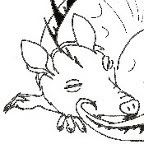 The Last of the Mohicans
The Last of the Mohicansby James Fenimore Cooper
I've always wondered how some books become "classics." It is truly quality and originality that transcend time? Or is it, sometimes, luck that makes a book popular (it's more of a fad then a "classic"), but the luck holds and even manages to grant the book longevity?
For example, I've read several books that I can't believe are classics—has anyone read any of the Tarzan books by Edgar Rice Burroughs, for example? Or even things like Uncle Tom's Cabin—completely racist (while trying to be propaganda for anti-slavery), political, and flat, that had a definite purpose at the time, but why are we still reading it now? And I've always thought Wuthering Heights a bit of...well, a gothic flop, if you must know. And yet, they are still classics.
I think this may very well be one of these books. It's an exciting* adventure story with plenty of violence and action. The characters are static and exaggerated (Cora is set up as the epitome of all lovely womanliness and virtue; Uncas as a paragon of masculine and Native American virtue and strength; Magua a representation of the Native American cruelty, cunning, and selfishness; Hawk-Eye the symbol of American resilience, cunning, strength, and the attempt to blend the Old World and the New). So, all characters are larger-than-life, not particularly believable, and occasionally annoying (especially Hawk-Eye and his long-winded ramblings about his world view—which never changes, just gets repeated over and over and over...blech).
And all these cardboard cut-outs go and have a big, hairy adventure that has a tragic ending. Fine for a stock fiction novel, I suppose, but for a classic? I must say, if it was just adventure and action I wanted, I much prefer the movie (especially after the interesting things they did to the original plot—a much more riveting story, I think).
 Though I shouldn't be so hard on the book. There are some things about it that are of worth, such as taking a look at frontier life through the eyes of Cooper. Some historians give him a great deal of credit for accuracy, especially to the extent that he understood the Native American cultures.
Though I shouldn't be so hard on the book. There are some things about it that are of worth, such as taking a look at frontier life through the eyes of Cooper. Some historians give him a great deal of credit for accuracy, especially to the extent that he understood the Native American cultures.Also, the thematic undercurrents of race were interesting: each race seemed to consider itself superior to the others, and everyone considered themselves as superior to the blacks (even though there was only one character who had a trace of black ancestry in her, which was carefully hidden). It was a time in history steeped in prejudice. Of course it was.
The great thing is that Cooper himself was not racist in the sense that he thought one race was better to another (which idea I got through Hawk-Eye and his incessant monologues), but he did feel that the different races were fundamentally different—had different world views, talents, and abilities more as a result of differing cultures. After all, Cora, who I've mentioned before set up as the epitome of womanliness, was the person whose mother was partially black. (But before I can argue that Cooper wasn't racist, it was, after all, Cora whom he sacrificed at the end, and her white sister he let live on.)
But, hey, even after an interesting dip into a the literary theory of "race," I'm not likely to read this book again.
*Exciting for the time it was written, I mean. I found the action a little dull, used to things like, oh, television and movies, you know.




No comments:
Post a Comment